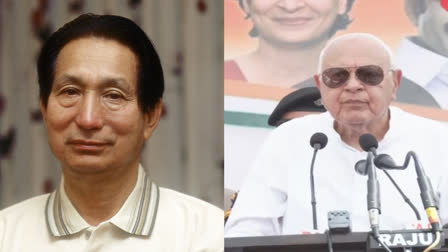Hyderabad:The BJP candidate from Surat Mukesh Dalal was elected unopposed on Monday. The Surat Returning Officer gave Dalal a certificate of election and thus BJP won the first seat in the Lok Sabha polls. Now elections will not be held in Surat on May 7, the date of polling. The Congress accused the BJP of 'match-fixing'.
In the past, former Maharashtra Governor SC Jamir and former Jammu and Kashmir Chief Minister Farooq Abdullah were among those who were elected to the Lok Sabha unopposed.
What is an Uncontested Election?
The Election Commission of India, in its handbook for returning officers, says "If in any constituency there is only one contesting candidate, declare that candidate to have been duly elected immediately after the last hour for withdrawal of candidature. In that event, a poll is not necessary."
In the past 28 Lok Sabha candidates have won their respective seats uncontested. As many as seven states and one Union territory have sent more than one MP to Parliament uncontested, including Andhra Pradesh, Assam, Odisha, Tamil Nadu, Uttar Pradesh,Telangana, Sikkim and Jammu and Kashmir.
As many as 4 MPs were elected unopposed from Jammu and Kashmir. In 1951, when India had double-member constituencies (before it was abolished in 1961), five members of parliament (MPs)—Anand Chand (Bilaspur), T.A. Ramalingam Chettiar (Coimbatore), Major Gen. H.S. Himmasinhji (Halar, Saurashtra), T. Sangana (Rayagada-Phulbani) and Krishna Charya Joshi (Yadgir, Hyderabad) were elected uncontested from their respective seats.
In 1957, another five candidates were elected uncontested — Mangrubabu Uike (Mandla, Madhya Pradesh), H.J. Siddananjappa (Hassan, Mysore), D. Satyanarayana Raju (Rajahmundry, Andhra Pradesh), Sangam Laxmi Bai (Viccarabad, Andhra Pradesh) and Bijoy Chandra Bhagawati (Darrang, Assam).
The number came down in 1962 when only three Lok Sabha members won uncontested. Among them was former finance minister TT Krishnamachari who won from Tiruchendur in Madras state. The other two uncontested winners from 1962 included Harekrushna Mahtab (Angul, Odisha) and Manabendra Shah (Tehri Garhwal, Uttar Pradesh).
Five members were elected to the Lok Sabha in 1967, including two from Jammu and Kashmir. M.S. Qureshi won from Anantnag while Kushok Bakula Rinpoche, one of the leading names of Ladakh, was elected uncontested to the fourth Lok Sabha.
Former Nagaland Chief Minister and former Union minister SC Jamir became the state's first Lok Sabha MP when he won uncontested in 1967 on a Nagaland Nationalist Organization (NNO) ticket. R Brahma, who was Kokrajhar's first MP to the Lok Sabha also won his elections uncontested.
In 1971, there was only one instance of an uncontested win, which went to Padanatha Mohammad Sayeed, from Lakshadweep. In 1977 one of Arunachal Pradesh’s earliest MPs in the Lok Sabha, Rinchin Khandu Khimre of the Congress won uncontested, while Sikkim’s first Lok Sabha MP, Chhatra Bahadur Chhetri, was also a beneficiary of an uncontested win in the same year.
One of the more high-profile uncontested wins across Lok Sabha elections came in 1980 when former Jammu and Kashmir Chief Minister Farooq Abdullah won his seat in Srinagar uncontested. In 1989, when the National Conference’s Mohammad Shafi Bhat repeated Abdullah’s feat and won the same seat, in the same manner.
In the 2012 Lok Sabha by-poll, Dimple Yadav was declared elected unopposed from the Kannauj Lok Sabha seat in Uttar Pradesh. Politicians who got walkovers in general elections include former Deputy Prime Minister and Maharashtra Chief Minister Yashwantrao Chavan from Nasik seat.
